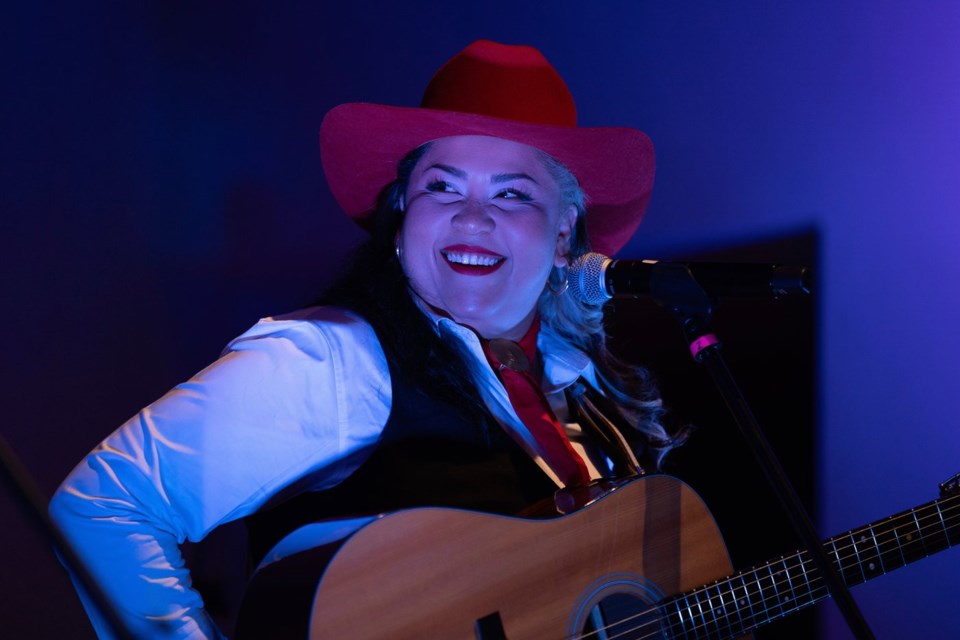MEXICO CITY (AP) ā Two days before her new album was launched, musical icon Vivir Quintana was behind barbed wire at a womenās prison in . The singer had spent the past 10 years visiting women incarcerated after defending themselves and, in doing so, killing their abusers.
Their stories became part of āCosas que Sorprenden a la Audienciaā (Things that Surprise the Audience), Quintana's latest album, released Thursday.
It tells the story of 10 such women but in a first, Quintana does it through ācorridos,ā a typically male-dominated and controversial Mexican music genre thatās soared into the spotlight in recent years.
The album, Quintana explained, was born out of her desire to dive into the more complicated aspects of gender-based violence.
āThis album has a different heart,ā Quintana, 40, said in an interview, donning bright red boots, her signature streak of gray slicing through her black hair. āThis album wasnāt made to sell, itās to change minds.ā
'So many times I didnāt defend myself'
The songs are meant to raise awareness about across Latin America ā human rights groups estimate that an average of 10 women are killed in Mexico every day ā and a justice system that many believe protects abusers and silences women's voices.
In many cases, women like the ones in Quintanaās corridos are charged with āexcessive legitimate self-defense," charges that have fueled outrage among many in Mexico.
āSo many times I feared for my life. So many times I didnāt defend myself,ā Quintana crooned, cradling her guitar as her booming voice echoed through the halls of her record label building on Wednesday. āNow I live locked up in a prison, and I feel more free than I did in my own home.ā
Amplifying womenās voices has been a hallmark of Quintanaās career, and and beyond.
In 2020, her āCanciĆ³n Sin Miedoā (Song Without Fear) became an anthem for Mexicoās Womenās Day march and the feminist movement in Latin America.
In 2022, she co-wrote a melancholy hymn about healing and freedom for the album of the Black Panther sequel. And last year, she was recognized at the Latin Grammys as one of four Leading Ladies of Entertainment.
A cultural reckoning
Quintana's new music goes further. She uses ācorridos,ā a type of northern Mexican ballads that has seen both an international renaissance and a backlash, with critics claiming that ānarco corridosā ā songs that glorify cartel violence and use misogynistic lyrics ā have dominated the form.
The topic has grown so heated that the of members of one band who projected the face of a drug cartel boss onto a large screen during a performance.
Instead of banning the corridos as a growing number of Mexican states have done, the country's first woman president, Claudia Sheinbaum, has proposed that the government promote a new style of corridos that .
āWeāre not banning a musical genre; that would be absurd," Sheinbaum said recently. "What weāre proposing is that the lyrics not glorify drugs, violence, violence against women or viewing women as a sexual object.ā
āI didnāt want to die by his handsā
Quintana's corridos turn the genre on its head, paying tribute not to violence or criminals, but to women who have been criminalized for defending themselves.
The first song on her album, āEra Ćl o Era Yo (It Was Either Him or Me) tells the story of for killing a man who was raping her and threatened to kill her in 2021.
āThis isnāt justice,ā Ruiz said after the court ruling. āRemember, I am the one who was sexually assaulted by that man, and after he died because I defended myself ā¦ because I didnāt want to die by his hands.ā
Mexican prosecutors later withdrew the case against her after a countrywide outcry.
One song tells of a 14-year-old girl in the southern state of Tabasco who killed her father when he was abusing her mother. Another tells of Yakiri Rubio, who was kidnapped by two men, taken to a hotel and raped. After killing one of the men, she was taken to prison and charged with "homicide by excessive legitimate self-defense."
With each song, Quintana would follow local news reports, interview the women in prisons and spend time with their families, hoping to capture their personalities ā and not just the violent act that transformed their lives.
āItās something painful that the state tells you that if you defend yourself, weāre going to punish you,ā Quintana said. āItās like up until what point do we care about womenās life?ā
Shifting the conversation
Quintana's inspiration stemmed from a childhood memory of a classic corrido she first heard at the age of 5, played at parties and on the radio in her native northern Mexican state of Coahuila.
The ballad is about a woman named Rosita AlvĆrez, violently killed when she tried to go out to dance. Later, when she was 15, Quintana's best friend was , the slaying of women because of their gender. It was then that the brutality of the lyrics sank in.
Quintana's album seeks to shift the tone of the corridos to capture the harsh realities Mexican women face, she said, and explore ongoing violence against women and other kinds of āmachismoā with nuance.
Her purpose, she added, is to lift up survivors of gender violence and to provide a point of connection for incarcerated women like those in her ballads.
āThey tell these women, you defended yourself, you killed someone and you're in prison, you don't have the right to feel joy, enjoy life, you don't have the right to anything,ā Quintana said.
āBut it's important to dance to these things, no?" she added. "Because people have to understand that they have the right to music, the right to art, and more than anything, the right to beauty.ā
Megan Janetsky And Fernanda Pesce, The Associated Press




